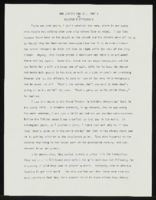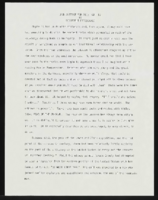Search the Special Collections and Archives Portal
Search Results

"And Justice for All: Part V": article draft by Roosevelt Fitzgerald
Date
Archival Collection
Description
From the Roosevelt Fitzgerald Professional Papers (MS-01082) -- Drafts for the Las Vegas Sentinel Voice file. On the mistreatment/discrimination of Chinese, Japanese, and other minority groups.
Text

"And Justice for All: Part IV": article draft by Roosevelt Fitzgerald
Date
Archival Collection
Description
From the Roosevelt Fitzgerald Professional Papers (MS-01082) -- Drafts for the Las Vegas Sentinel Voice file. On the mistreatment/discrimination of Chinese Americans.
Text
University of Nevada, Las Vegas Department of Theatre Records
Identifier
Abstract
The University of Nevada, Las Vegas Department of Theatre Records (approximately 1960-2017) are mainly comprised of the records of Ellis Pryce-Jones who was a faculty member in the Theatre Arts Department from 1972 to 2004 and Jerry L. Crawford who served as chair of the Theatre Department and the Dean of the College of Fine Arts. Records mainly represent shows produced by the Theatre Arts Department as well as documenting the evolution of the department over the years. The records document curricula used for courses, video recordings of the department's performances, and posters and other materials used to market shows. Additionally, there is a small portion of documentation from other theaters where staff and students performed and worked, some of which are located in Southern Nevada.
Archival Collection
John P. Watkins oral history interview
Identifier
Abstract
Oral history interview with Dr. John P. Watkins conducted by Claytee D. White on April 29, 2009 for the Boyer Early Las Vegas Oral History Project. Dr. Watkins talks about his schooling, his medical career, and medicine and medical practitioners in Las Vegas, Nevada from the mid-1950s. He recalls how he met his wife, Frances (née) O’Rourke, and the Las Vegas places he, Frances, and their sons John and Brian lived. In particular, he describes their Desert Inn Country Club neighbors and neighborhood, where he and his family lived for fourteen years. He then discusses Las Vegas as a gateway to outdoor activities.
Archival Collection
Rodrigo Vazquez oral history interview
Identifier
Abstract
Oral history interview with Rodrigo Vazquez conducted by Nathalie Martinez and Barbara Tabach on May 24, 2021 for the Latinx Voices of Southern Nevada Oral History Project.
Rodrigo was raised in a mixed status Mexican family. He was born in Mexico and immigrated to the United States at the age of three, later becoming a citizen when he was in the 8th grade. Rodrigo is currently a graduate student worker for the Latinx Voices Oral History Project and reflects on what he has learned. He also discusses what the past year of the Coronavirus pandemic has been like for him.
Subjects discussed include: Latinx and Mexican identities, COVID-19 era, and Latinx Voices Project oral historian
Archival Collection
Bruce E. Miller oral history interview
Identifier
Abstract
Oral history interview with Dr. Bruce E. Miller conducted by Pauline MacDonald on May 11, 2006 for the Public School Principalship Oral History Project. In this interview, Dr. Miller reflects upon his roughly 40-year career as a teacher and administrator with the Clark County School District from the 1950s to the 2000s. He discusses his experiences as a teacher at J. D. Smith Middle School and Rancho High School, and his approach to education and school administration. He discusses student cultural diversity, school integration, curriculum changes, and standardized testing. He also describes his regular job responsibilities and challenges, and offers suggestions for how to be a successful school administrator.
Archival Collection
Steven D. McCoy oral history interview
Identifier
Abstract
Oral history interview with Steven D. McCoy conducted by Hope Vigil-Delgado on November 26, 2001 for the Public School Principalship Oral History Project. In this interview, McCoy reflects upon his 33-year career as a teacher and administrator with Nevada’s Clark County School District. He describes the process by which he became a teacher, and discusses how his teaching experience shaped his approach to school administration. He discusses his experience at Roy Martin Middle School, and describes the student cultural diversity and bilingual education programs within the school. He also discusses various programs that he implemented at various schools, and describes his approach to teacher evaluations and dismissals.
Archival Collection
Joan Olson Griffith oral history interview
Identifier
Abstract
Oral history interview with Joan Olson Griffith conducted by Sharee Schrader on April 12, 2005 for the History of Blue Diamond Village in Nevada Oral History Project. Griffith begins by discussing why she moved to Blue Diamond, Nevada with her family due to job opportunities at the Blue Diamond Plant, where they manufactured wallboard, in 1956. She describes life in Blue Diamond and rural Nevada, the education available in the village, and Blue Diamond's proximity to Bonnie Springs Ranch and structures made for the filming of Western themed media. Griffith concludes by discussing how Blue Diamond has changed since the 1950s and being a Sunday school teacher for eighteen years.
Archival Collection
Elbert Edwards oral history interview
Identifier
Abstract
Oral history interview with Elbert Edwards conducted by Layne Covington on October 16, 1986 for the Ralph Roske Oral History Project on Early Las Vegas. Edwards first talks about his family background before talking about what it was like to live in Panaca, Nevada. Edwards later talks about his wife’s and his political involvement, and his involvement in education. He then discusses Hoover (Boulder) Dam, his job as a registrar in the Selective Service, and the effects that the World War II years had on Las Vegas, Nevada.
Archival Collection
Susanne E. Morrow oral history interview
Identifier
Abstract
Oral history interview with Susanne E. Morrow conducted by Dennis McBride on September 29, 2000 for the Las Vegas Gay, Lesbian, Bisexual and Transgender Archives Oral History Project. Morrow begins by discussing her childhood in a military family, her marriage and children, and her move to Genoa, Nevada in 1961. She then talks about her move to Carson City, Nevada in 1962 and her twenty-nine year career as a journalist and city editor for the Nevada Appeal newspaper. The remainder of the interview focuses on Morrow's memories of the 1965 assault on then Chief Justice of the Nevada Supreme Court, Frank McManee, and the subsequent judicial actions and court decisions that reflected attitudes toward homosexuality prevalent in society at the time.
Archival Collection
